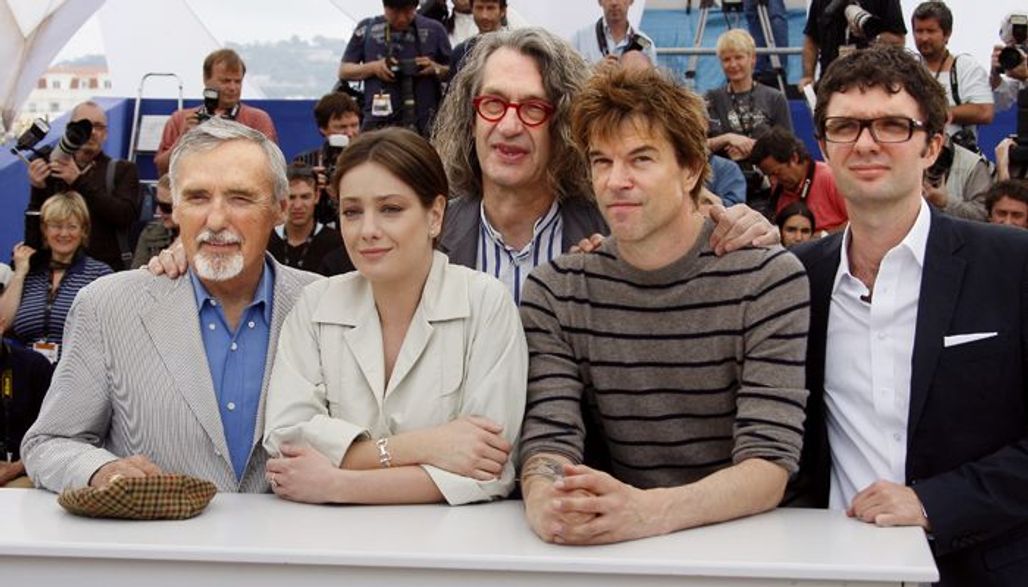
Press conference: “Palermo Shooting”

Palermo Shooting, the latest feature from Wim Wenders, is screening in Competition. For the occasion, the German director was joined by actors Campino, Dennis Hopper, and Giovanna Mezzogiorno along with producer Gian Piero Ringel at the podium to field questions from the press. Highlights follow.
Wim Wenders on the dedication of his film:
“If you make a film about a photographer, there’s only one reference, that’s Blow Up, and if you make a film where death appears as a person, there’s only one reference [Ingmar Bergman]. And I was writing this story about a photographer who meets death and found myself in a little town in Italy called Gangi. In the morning, I opened the newspapers that told me that Ingmar Bergman had died. And in a strange way, this little town took part in this event. It was the talk of the day. And the next morning I came back to the same coffee shop in my car and a policeman stopped me at the only crossing in Gangi. I rolled down my window and he leaned in to tell me that last night Michelangelo [Antonioni] died as well. I don’t know anywhere else in the world where you can share that with a city. So it is dedicated to these two.”
Dennis Hopper on his role and Wim’s style:
“It’s an honor to work with Wim again after 31 years. His early road movies were shot out of the back of their truck in Germany, his use of rock and roll, the idea that a still is a death of its own, that you capture something and then it’s gone forever… I felt that the part was really a reflection of Wim: his investigation of Nicholas Ray’s death in Lightning Over Water and the way he directs; he’s a very gentle director who is intelligent and gives you space to work in and takes care of you. The way “death” is written was a misunderstood passage in the same way he talks about birth being a door and a passage and everyone celebrates. But when it comes to death, it becomes another passage, another doorway, and everybody thinks of him as a bad guy.”
Giovanna Mezzogiorno on her character:
“The first day we met in Palermo, he brought me to see the fresco. What is interesting about Flavia is that she understands Finn; she believes him because she lived something having to do with death. She’s the right person to help him come out of that moment of his life. She believes him totally, she knows he’s not lying to her, she recognizes a person who’s really scared.”
Campino on being a musician and coming over to cinema:
Of course, a video is something completely different; you really can’t compare it [to a feature film]. Otherwise, I must say, Wim knew that I was not too experienced. If I made an OK career as a bad singer, I maybe would be OK as a bad actor too, so I decided to come along.”
Wim Wenders on the soundtrack:
“Music is important in my life, you know that, but in this case it’s quite different. The courage to make this movie came from rock ‘n roll. The courage to make a film about this topic and to talk about things that concern us all very deeply and not on an artificial level but an existential level came from listening to rock ‘n roll. You’re in a stadium and 50,000 people are singing the words with you. So I decided to make this film like rock ‘n roll. Lou Reed was written into the movie and I put him in the movie because he is the greatest living poet in my book of rock ‘n roll. Rock ‘n roll does things that unfortunately films have given up daring.”
Wim Wenders on cinema of today:
“We were still in the mixing stage when the Festival opened, so I didn’t have a chance to see much of the other films. I think cinema is very much alive after all; the kind of cinema that is alive is the one that is not referring to formulas. That is my hope, that sort of cinema will survive and be strong, the one that still believes that what happens on the screen had a certain reference to what happens in our lives. That’s the cinema I’m fighting for, that I love and I defend. I teach and that’s the cinema they believe in; they don’t believe in recipes, in genres.”


